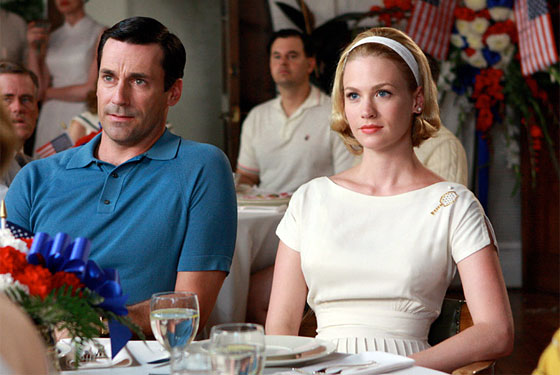
Recently, Mad Men has framed Don and Peggy as warped reflections of each other: both guarding private lives, both managing public images, and both nearly going crazy with the pressure of juggling both. This episode, they take their circus act into a hall of mirrors.
The Pitch
Image is everything.
The Campaign
This slow, cerebral episode opens with a jarring montage of ladies hoisting themselves into undergarments (what’s with that Decemberists soundtrack?) in order to hammer home this week’s overt theme: how our private self-images relate to our outer selves. Sorry if that sounds academic, but as Duck’s daughter says: “It’s Memorial Day — all I have is German vocabulary.” This episode is packed with references to that Teuton Freud and his successor Lacan. Both an advertisers’ dream and worst nightmare, Lacan was obsessed with how a person’s self is bound up in image-making — and inevitably tormented by the distance between one’s ego and mirrored self-image. He practically deserves a screenwriting credit for this one.
This installment is a mirror maze. In the office, the crew pitches a new Playtex campaign with a mirror at the center: the same model, reflected and dressed in black and white lingerie. The guys say that every woman sees herself as either a Marilyn or a Jackie, but every woman has a little bit of both. Don is Betty’s dark mirror, telling her that her hot bikini makes her look desperate. Her stable boy reflects something more attractive and young. After Don ties Bobbi down in a hotel bed, she shows him what he looks like to women — and it isn’t what he expected. He’s disgusted to find that he’s got “a reputation” and that the “full Don Draper treatment” is the stuff of legend.
Three times, men are pitted against the image of the war hero. Pete finally cheats on his wife with a blonde model, in the blue glow of a war movie on TV (before smiling at his sinister reflection at home).
In a face-off with Don, Duck pushes a war-hero version of himself, gets dissed, and sees his pathetic, defeated self ludicrously reflected in the unconditional love of his shaggy dog. Painfully, Don sees himself twice in the adoring stares of his angelic daughter. The first stare — at a Memorial Day lunch honoring veterans’ service — triggers Don’s flight response: He’d rather run away than try to be that little girl’s hero. The second look — in his many-mirrored bathroom — triggers a panic attack: Now that he knows his reputation is out there, is he terrified that she’ll see him as he truly is someday?
In each case, the men are disturbed by the dissonance, which Lacan called a “lack” — but nobody’s identity is more in flux than Peggy’s. She’s not a Marilyn or a Jackie. (“You’re Gertrude Stein,” jokes Ken.) Finally, after being left out of the loop one too many times in the office, Peggy takes the advice of Joan and Bobbi and all the advertisers she works for — and tries on a sexier version of herself. Post- makeover, she struts into a gentlemen’s club wearing bright-red lipstick and heels. She flounces right past the office boys and plops herself right down on the Playtex magnate’s lap, not even cringing when he asks her to “tell Santa what you want for Christmas.” Pete glares, but this time (unlike at her big party), Peggy refuses to see herself as Pete does.
The Early Results
This was Duck’s chance to seem human — dog and kids in the office — but it fell flat. Would you miss him if he was kicked to the curb? Don and Peggy keep getting more intriguing, not less. The particular shape and size of Don’s panic is becoming clearer. Meanwhile, Peggy isn’t just going to become a Bobbi or a Betty — she’s evolving into something new.

